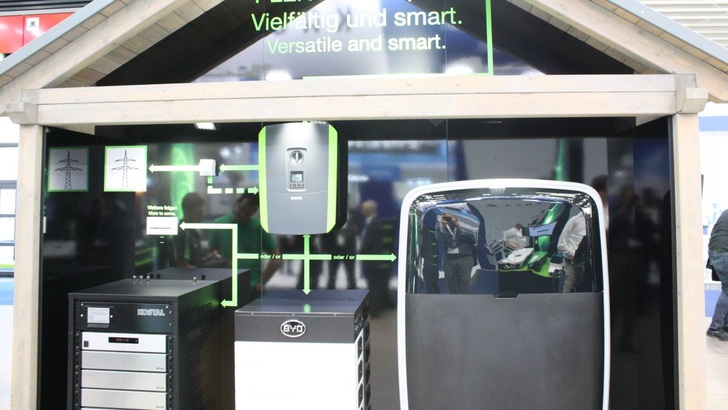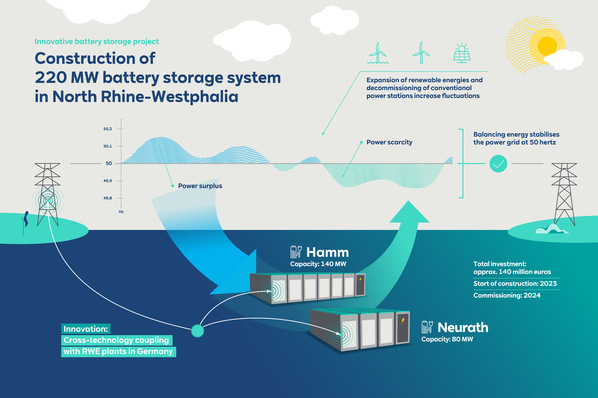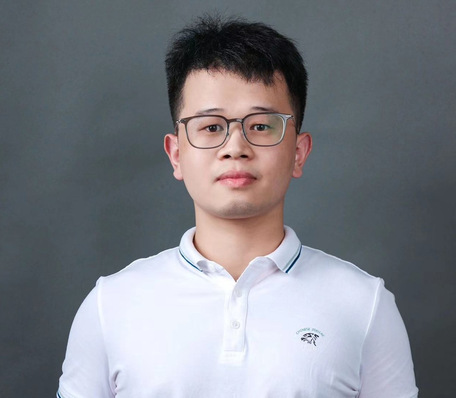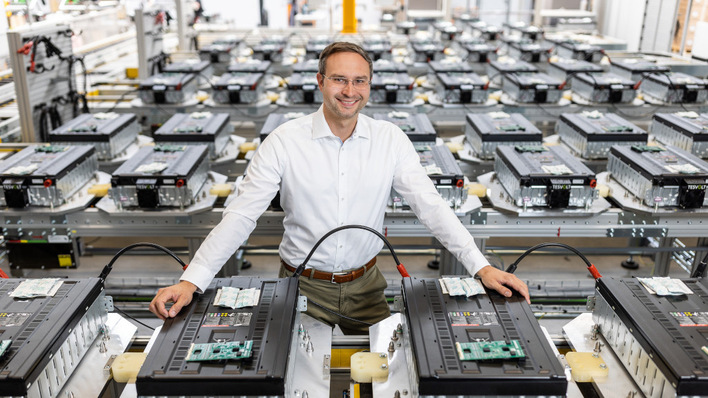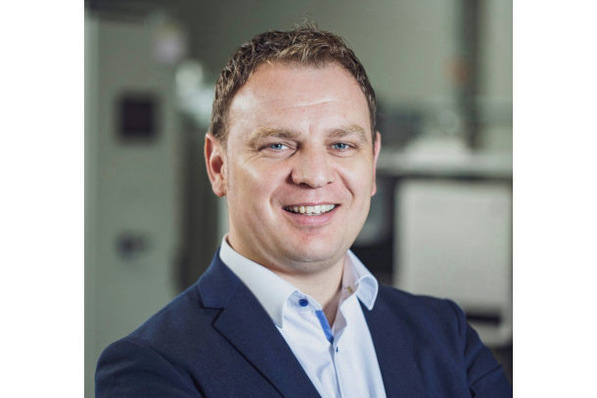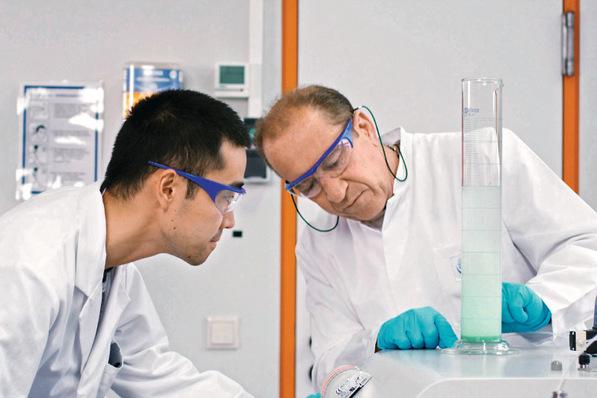This is what records look like: As many as 509 interested visitors joined our PV Guided Tours this year. Selected manufacturers presented their innovations to our readers. Last year there had only been 367 participants.
By far the greatest interest was in home storage for private end customers. 136 participants were guided by our tour guide to the interesting new products. They were happy with the information they were provided with during the tours. The exhibitors were just as happy with the large crowds. After all, we often arrived at the stands with two dozen or more pre-informed visitors in tow. Once there, frank discussions were had, and deals were done.
EFT relies on BYD batteries
The first stop on our tour was EFT-Systems from Lohr in Hesse. The company presented itself as a partner of the Chinese battery manufacturer BYD: in terms of after-sales service, technology, training and delivery logistics. EFT is one of the most important German importers of BYD’s B-Box battery system.
By their own account, BYD has become the world’s largest manufacturer of EVs and one of the largest manufacturers of rechargeable batteries. The high-tech company, based in Shenzhen, China, was founded in 1995. Today BYD has offices in more than 50 countries and regions.
Our contact person at the stand of EFT Systems was Florian Blaser. He introduced us to three highlights. The Battery Box HV, he explained to us, is the first truely rechargeable high-voltage battery using a flexible modular design and without connecting cables. One box contains five to nine battery modules, connected in series, with up to 11.52 kilowatt hours of utilisable capacity.
Connecting up to five such boxes in parallel gives a total storage capacity of up to 57.6 kilowatt hours. The patented cable-free connection system makes installation quick and easy.
The second highlight was the 48-volt Battery Box LV, which is the low-voltage version. It also comes in a modular design and with wireless connections. It can be used to connect up to twelve individual battery modules. Capacities range from 3.5 to 42 kilowatt hours. The Battery Box Pro 13.8 works according to the same principle and provides up to 442 kilowatt hours of storage capacity when connected in parallel.
NES are counting on “Made in Germany”.
We move on to the stand of New Energy Systems, NES for short. Willi Muhlbauer is the founder and CEO of the company based in Stephanskirchen near Rosenheim.
Together with his team, the experienced master electrician has developed very efficient and inexpensive components for charging up lithium-ion high-voltage batteries via DC-connected charge electronics. The figures are impressive: The outputs for charging and discharging are significantly higher than for comparable products on the market – at extremely low losses.
NES offers storage units between four and 6,000 kilowatt hours of capacity and from ten to 800 kilowatts of charging output. The charge electronics have two independent inputs where the power output can be adjusted – at voltages of up to 900 volts. A bidirectional connection point for charging and discharging suitable EVs is possible. So far, the Japanese models by Nissan and Mitsubishi can be integrated.
Flexible input parameters allow the connection of different energy sources such as solar, wind, hydro, diesel generators or cogeneration units. The simple scalability of the charge electronics and storage units makes outputs of up to 120 kilowatts and storage capacities of up to 432 kilowatt hours possible. Systems of up to one megawatt hour complete the range.
Monitoring worldwide with Solar-Log
Our tour went on to a company that has in recent years grown to become a global player. We are talking about Solar Data Systems (SDS), better known by the name of their data logging system Solar-Log.
SDS launched the first products of this series back in 2007. In the meantime, the range of functions of the system has been considerably expanded. Solar-Log became almost synonymous with monitoring solar systems and efficient feed-in management. The system is currently installed in 118 countries and monitors around 280,000 installations with a total capacity of 12 gigawatts.
Particularly private households that produce their own solar electricity can benefit greatly from battery storage. By operating the storage batteries via a data logger, the proportion of self-consumption can be significantly increased, and energy costs can be noticeably reduced.
By integrating the storage battery into the Solar-Log system, measurements such as the current charging status and the charging and discharging output can be accessed directly over the Internet. As a helpful option, the system also displays the charging history over the last and the last seven days. Further information from the storage system ensures the most effective use of the battery.
Innogy presents virtual Solar Cloud
Innogy is one of the big players on the market. With more than 42,000 employees and 22 million customers, the company generated sales of around 43 billion euros in 2017. It is represented in 16 European countries.
One of Innogy's exhibition highlights was the so-called Solar Spring Stunner, which offers German brand quality for an attractive package price: For 9,990 euros including VAT and standard installation, the end customer receives a complete solar and storage solution with intelligent energy management. Innogy also offers an optional service package.
The participants in our tour were particularly interested in the Innogy Solar Cloud – a virtual storage solution for solar power. The principle is simple: The customer can store his surplus solar electricity for a reasonable monthly fee. Whenever it is needed, one hundred percent of it is available to him. The size of the virtual memory can be selected as needed.
A high self-consumption rate can be achieved with the Innogy Energy Manager. The system controls the consumers in such a way that all electrically operated appliances in the house run as often as possible with electricity from the customer’s own solar system. This reduces energy costs and yield losses through optimal balancing of generation and consumption.
ABB increases energy self-sufficiency
A few steps further, Martin Freyberg was waiting for us at the stand of ABB Solar. ABB is one of the leading technology companies in electrification, robotics and drive trains, industrial automation and power networks. The company operates in more than 100 countries and employs around 135,000 people, around 10,550 of whom work in Germany. Sales in Germany amounted to 3.26 billion euros in 2017.
Our partner explained his company’s latest storage solution, React 2, which can manage capacities of up to 12 kilowatt hours. The solution comprises a lithium-ion battery and can be extended modularly from four to 12 kilowatt hours.
According to ABB Solar, the system achieves up to ten percent more efficiency with its 200-volt high-voltage battery compared to systems with 48-volt low voltage. React 2 is suitable for use in new solar systems and for retrofitting.
In combination with Busch-free@home, homeowners can make optimum use of the electricity generated by their photovoltaic system and avoid consumption peaks. The system wirelessly transmits information about solar energy, self-consumption and battery status to the Busch-free@home smart home system.
In this way, the complete building management can be controlled via Smart Home. It can also be used to operate a charging solution for electric vehicles, such as ABB's new EV Lunic AC wall-mounted charging station. React 2 further offers an emergency power supply for areas with unreliable power supply or in the event of a power failure.
Kostal presents the new Plenticore
Kostal can boast of more than 100 years of experience as an automotive supplier. The company specializes in string inverters and storage systems for private and small commercial photovoltaic systems.
The focus of their trade fair presentation is the new hybrid inverter Plenticore plus. With this, according to our contact Thomas Garber, Kostal is setting a new standard: “Because the system always fits, no matter for which photovoltaic system and requirement”.
As just a solar inverter with up to three solar inputs, the Plenticore delivers optimum yields even under demanding shading conditions. The third input can optionally be used to connect a battery, which can also be retrofitted at any time.
In addition to charging the battery directly from the company’s own photovoltaic system, the device also enables additional charging via another AC energy source such as a cogeneration unit, wind power or another solar system. The hybrid inverter is available in five output categories between 4.2 and ten kilowatts and is certified for a variety of high-voltage batteries.
Kostal also has a new string inverter in its product range: Thanks to the fast, self-learning shade management system and the wide MPP range, the smart Piko IQ gets more out of every solar system, Thomas Garber explained.
In addition to these three-phase inverters, Kostal Solar Electric presented the new Piko MP plus in the output categories between 1.5 and 4.6 kilowatts. The single-phase system is ideal for small photovoltaic installations on family homes and can be used with as few as three solar panels. The Piko 36 EPC, on the other hand, is specially designed for large-scale installations.
Baywa r.e.: Everything from one dealer
Andreas Reischl presented the innovations of Baywa r.e.. This wholesaler is based in Tübingen and has four more sales locations in Germany. In addition, there are offices in Poland, Denmark and Sweden.
Baywa r.e. positions itself as a systems provider for all components in the photovoltaic industry and a full-service partner for solar engineers and project developers. The product portfolio ranges from solar panels, inverters, storage systems and hot-water heat pumps to electrical charging stations.
Our contact person showed us a selection of storage systems. The spectrum is indeed impressive: It begins with the 48-volt battery inverter Sunny Island and the high-voltage inverter Sunny Boy Storage by SMA. Of course, Asian companies are also represented, for example Huawei with their Sun 2000L, a smart, single-phase series of high-voltage hybrid inverters. We saw two products from Solaredge as well as Fronius’ three-phase hybrid inverter for the AC/DC Symo Hybrid.
In addition, several products that have already been presented to us in the past two hours – such as Kostal’s Plenticore plus or several Battery Boxes from BYD – were represented at this stand.
The two hours we had set for our Home Storage Tour went by really fast. The participants seemed very satisfied. One visitor, who obviously could hardly wait, asked: “Is is already possible to sign up for next year?” When told about the other Tours, he immediately signed up for one of the ones in the afternoon.
No question: At the trade fair The smarter E Europe in Munich 2019 we expect even more exhibitors and an even greater interest from visitors in our PV Guided Tours on home storage. (Herbert Grab)
Watch our PV Guided Tour on home storage systems:
http://www.pveurope.eu/Videos/pv-Guided-Tours-videos-2018
Stay informed, get our newsletter twice a week.
Register here: http://www.pveurope.eu/Newsletter
Read more about solar modules.
Read more about solar mounting systems.
Read more about solar energy storage.

